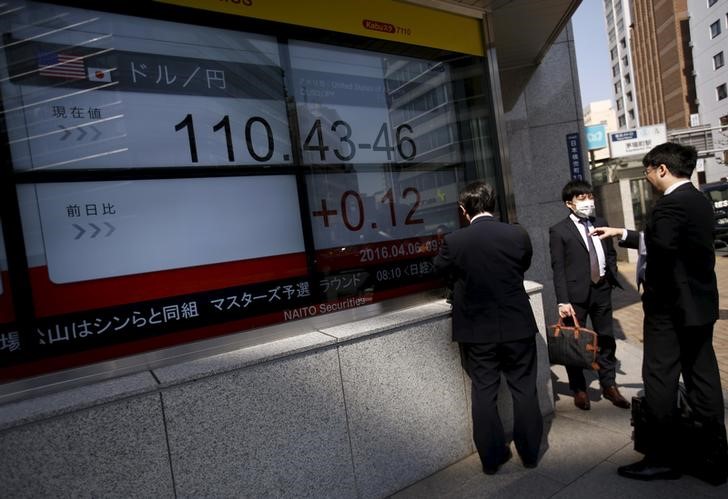By Nichola Saminather and Shinichi Saoshiro
SINGAPORE/TOKYO (Reuters) - Asian stocks inched up on Friday, after a surge in oil prices helped propel Wall Street to record highs , while mainland shares held on to gains on hopes that weaker-than-expected Chinese economic data would spur policy easing.
The positive sentiment is, however, unlikely to spread to Europe, with spreadbetter CMC Markets expecting Britain's FTSE 100 and Germany's DAX to open down 0.1 percent, and France's CAC 40 to start the day 0.2 percent lower.
MSCI's broadest index of Asia-Pacific shares outside Japan nudged up 0.2 percent. It was on track to advance 2 percent this week.
Chinese shares extended gains after fixed asset investment, retail sales and industrial output all rose but were below expectations. The CSI300 index rose 1.3 percent, heading for gains of almost 2.2 percent this week, while the Shanghai Composite climbed 1 percent, poised to end the week 1.9 percent higher.
The fixed asset investment data "suggests that we could see Beijing being pressed harder to roll out fiscal stimulus," said Bernard Aw, market strategist at IG in Singapore. "The prospects of fiscal pump-priming might have buoyed the equity traders."
China's fixed asset investment from January to July increased by 8.1 percent from a year earlier, the slowest rate in more than 16 years, compared with expectations for 8.8 percent.
July retail sales rose 10.2 percent, versus 10.6 percent the previous month and a forecast 10.5 percent. Industrial output climbed 6.0 percent from a year earlier, slowing from June's 6.2 percent and just missing forecasts of 6.1 percent.
Hong Kong shares rose 0.9 percent to their highest level in more than eight months, up 2.8 percent this week.
Japan's Nikkei closed up 1.1 percent on a slightly weaker yen, ending the week 4.1 percent higher.
Australian stocks ended the day 0.4 percent higher.
The S&P 500, the Dow Jones Industrial Average and Nasdaq all closed at historic highs on Thursday for the first time since 1999 on higher crude oil and upbeat corporate results. (N)
The pan-European FTSEurofirst 300 stock index also jumped, climbing 0.85 percent to its highest close since late May.
MSCI's 46-country All World index held close to a one-year high touched overnight.
"With central banks doubling down on easing bets, investors appear to be betting strongly that we could well see further gains given the ability of markets to absorb any number of setbacks, from concerns about China, Brexit, a slowdown in European GDP in Q2 against a backdrop of concern about the solvency of European banks," wrote Michael McCarthy, chief market strategist at CMC Markets.
Also supporting investor appetite for risk, oil prices climbed more than 4 percent overnight after a Saudi oil minister hinted at possible action to stabilise prices and the International Energy Agency said it expected the supply and demand balance to tighten towards year-end. [O/R]
They retained that momentum on Friday, with U.S. crude futures up 0.9 percent at $43.89 a barrel, on track to gain 5 percent on the week.
Global benchmark Brent crude climbed 0.7 percent to $46.18, set to end the week 4.7 percent higher.
The rise in risk appetite weighed on spot gold. The precious metal inched up 0.1 percent to $1,339.86 an ounce after losing percent 0.6 percent overnight.
Global markets will sift through the string of U.S. data, notably retail sales, due later in the session for latest cues about the world's largest economy and whether it is robust enough to withstand further monetary tightening.
U.S. retail sales are expected to show a 0.4 percent monthly increase in July, according to the median estimate of 64 economists polled by Reuters.
In currencies, the dollar rose after San Francisco Federal Reserve President John Williams told the Washington Post that the U.S. central bank should raise rates this year because of improving labour market conditions and the likelihood that inflation is heading higher.
The greenback was steady at 102.025 yen after gaining 0.7 percent on Thursday, and is heading for a 0.25 percent weekly rise. The euro was also flat at $1.11420 after losing 0.3 percent overnight.
The dollar index, which tracks the greenback against a basket of six major peers, rose 0.06 percent to 95.913, but was on track for a loss of 0.3 percent for the week.
The New Zealand dollar slipped 0.2 percent to $0.7198 after surging on Thursday to $0.7351, its highest in more than a year after the Reserve Bank of New Zealand cut rates by 25 basis points to 2.0 percent, a smaller cut than some investors had expected.

The Australian dollar dipped 0.2 percent to $0.7685.